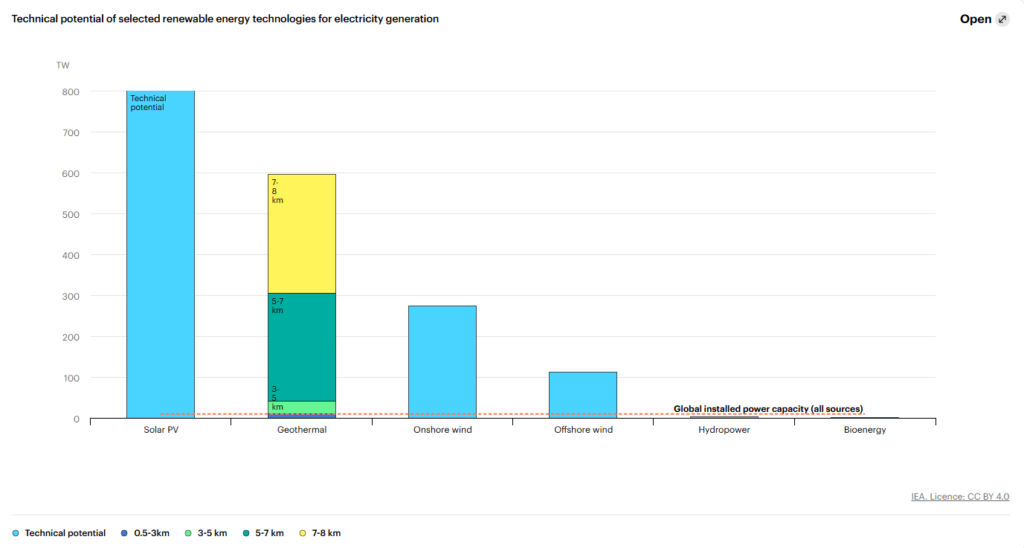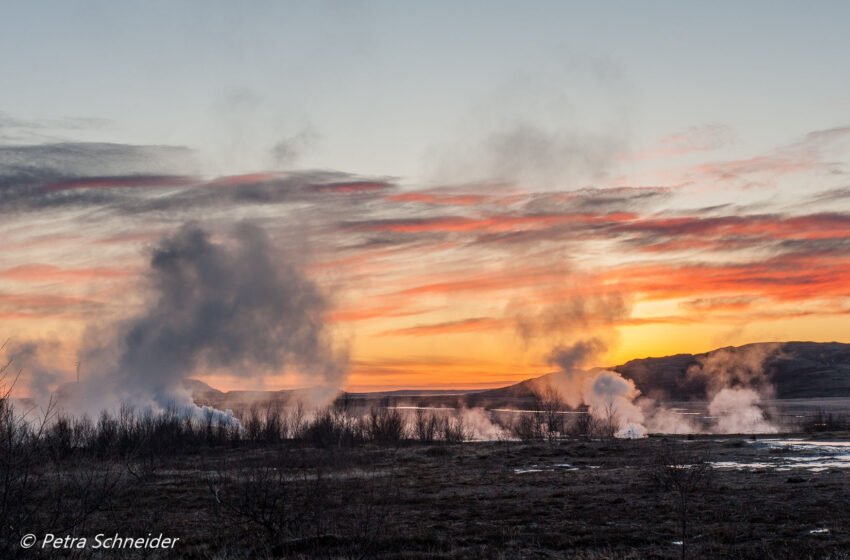Binance Locks $1 Billion Into Bitcoin—15K BTC Now Secured as
Geothermal energy could supply 15% of global electricity demand growth, says IEA
(Originally posted on : Invezz )
The shale oil drilling techniques which led to a boom in oil and gas production could be used to develop geothermal energy, and meet up to 15% of global electricity demand growth by 2050, the International Energy Agency said.
“With continued technology improvements and reductions in project costs, geothermal could meet up to 15% of global electricity demand growth to 2050,” the IEA said in its “Future of Geothermal Energy” report.
The agency said the development of geothermal energy through shale oil drilling techniques would mean the deployment of 800 gigawatts (GW) of power capacity worldwide.

This deployment would be able to produce 6,000 terawatt-hours per year, equivalent to the current electricity demand of the US and India combined.
“Advances in technology are opening new horizons for geothermal, promising to make it an attractive option for countries and companies all around the world,” the agency said.
These technologies would involve horizontal and hydraulic fracturing processes used in oil and gas developments in North America, according to the report.
At present, geothermal meets less than 1% of global energy demand and is only easily available in the US, Iceland, Indonesia, Turkiye, Kenya, and Italy.
Versatile and clean source of energy
According to the report, geothermal can provide around-the-clock electricity generation, heat production, and storage.
On average, global geothermal capacity had a utilization rate of over 75% in 2023, compared with less than 30% for wind power and less than 15% for solar PV.
“In addition, geothermal power plants can operate flexibly in ways that contribute to the stability of electricity grids, ensuring demand can be met at all times and supporting the integration of variable renewables such as solar PV and wind,” IEA said.
It is also a clean source of energy.
The Paris-based energy watchdog said the full technical potential of next-generation geothermal systems to generate electricity is second only to solar PV among renewable technologies.
This is enough to meet global electricity demand 140 times over, the agency said.
Investments in geothermal energy
Governments and oil and gas companies are among those looking for investment opportunities in geothermal.
IEA said:
If deep cost reductions for next-generation geothermal can be delivered, total investment in geothermal could reach USD 1 trillion cumulatively by 2035 and USD 2.5 trillion by 2050.
According to the report, at its peak, geothermal investments could reach up to $140 billion per year, higher than current investments in wind power.
“As a dispatchable source of clean power, geothermal is also attracting interest from stakeholders beyond the energy industry, including technology companies looking to meet the fast-growing demand for electricity in data centers.”

The awareness around the potential of geothermal energy comes at a time amid accelerating demand growth from cooling, electric vehicles, and data centers.
The agency said that the deployment of geothermal energy could bolster countries such as China, India, and Southeast Asia in their efforts to move away from fossil fuels.
“China, the United States, and India have the largest market potential for next-generation geothermal electricity, together accounting for three-quarters of the global total,” IEA said.
Key role of the oil and gas industry
IEA said that up to 80% of the investment required in a geothermal project involves capacity and skills that are commonly used in the oil and gas industry.
“The industry has transferable skills, data, technologies, and supply chains that make it central to the prospects for next-generation geothermal.”
It also presents diversification opportunities to the oil and gas industry amid large-scale efforts worldwide to limit the use of fossil fuels.
However, along with the support from the oil and gas industry, policy intervention is required for geothermal energy, IEA said.
“Along with support for innovation and technology development, governments could design policies that de-risk project development,” IEA said.
These could include policies focusing on risk mitigation measures at the early project development phase and on contracts ensuring long-term revenue certainty.
According to the report, more than 100 countries have policies in place for solar and wind energy. But, only 30 have implemented policies for geothermal.
The post Geothermal energy could supply 15% of global electricity demand growth, says IEA appeared first on Invezz







 Bitcoin
Bitcoin  Ethereum
Ethereum  Tether
Tether  XRP
XRP  USDC
USDC  Solana
Solana  TRON
TRON  Dogecoin
Dogecoin  Lido Staked Ether
Lido Staked Ether  Figure Heloc
Figure Heloc  Bitcoin Cash
Bitcoin Cash  WhiteBIT Coin
WhiteBIT Coin  Cardano
Cardano  USDS
USDS  LEO Token
LEO Token  Wrapped stETH
Wrapped stETH  Hyperliquid
Hyperliquid  Monero
Monero  Wrapped Bitcoin
Wrapped Bitcoin  Canton
Canton  Binance Bridged USDT (BNB Smart Chain)
Binance Bridged USDT (BNB Smart Chain)  Ethena USDe
Ethena USDe  Chainlink
Chainlink  Stellar
Stellar  USD1
USD1  Wrapped eETH
Wrapped eETH  Zcash
Zcash  Hedera
Hedera  sUSDS
sUSDS  Litecoin
Litecoin  Dai
Dai  PayPal USD
PayPal USD  Coinbase Wrapped BTC
Coinbase Wrapped BTC  Avalanche
Avalanche  Shiba Inu
Shiba Inu  Sui
Sui  WETH
WETH  Toncoin
Toncoin  Rain
Rain  Cronos
Cronos  USDT0
USDT0  World Liberty Financial
World Liberty Financial  Tether Gold
Tether Gold  MemeCore
MemeCore  PAX Gold
PAX Gold  Polkadot
Polkadot  Uniswap
Uniswap  Mantle
Mantle  Ethena Staked USDe
Ethena Staked USDe  BlackRock USD Institutional Digital Liquidity Fund
BlackRock USD Institutional Digital Liquidity Fund  Aave
Aave  Bittensor
Bittensor  Aster
Aster  Falcon USD
Falcon USD  Bitget Token
Bitget Token  OKB
OKB  Pepe
Pepe  Circle USYC
Circle USYC  Global Dollar
Global Dollar  HTX DAO
HTX DAO  syrupUSDC
syrupUSDC  Sky
Sky  Ripple USD
Ripple USD  Pi Network
Pi Network  Ethereum Classic
Ethereum Classic  Ondo
Ondo  NEAR Protocol
NEAR Protocol  BFUSD
BFUSD  Internet Computer
Internet Computer  Pump.fun
Pump.fun  Worldcoin
Worldcoin  Gate
Gate  KuCoin
KuCoin  POL (ex-MATIC)
POL (ex-MATIC)  Cosmos Hub
Cosmos Hub  Jupiter Perpetuals Liquidity Provider Token
Jupiter Perpetuals Liquidity Provider Token  Quant
Quant  Ethena
Ethena  Superstate Short Duration U.S. Government Securities Fund (USTB)
Superstate Short Duration U.S. Government Securities Fund (USTB)  Midnight
Midnight  Jito Staked SOL
Jito Staked SOL  NEXO
NEXO  Algorand
Algorand  USDtb
USDtb  Binance-Peg WETH
Binance-Peg WETH  Official Trump
Official Trump  Rocket Pool ETH
Rocket Pool ETH  Spiko EU T-Bills Money Market Fund
Spiko EU T-Bills Money Market Fund  Aptos
Aptos  Binance Bridged USDC (BNB Smart Chain)
Binance Bridged USDC (BNB Smart Chain)  Render
Render  Wrapped BNB
Wrapped BNB  Janus Henderson Anemoy AAA CLO Fund
Janus Henderson Anemoy AAA CLO Fund